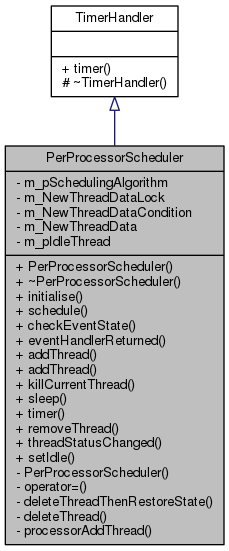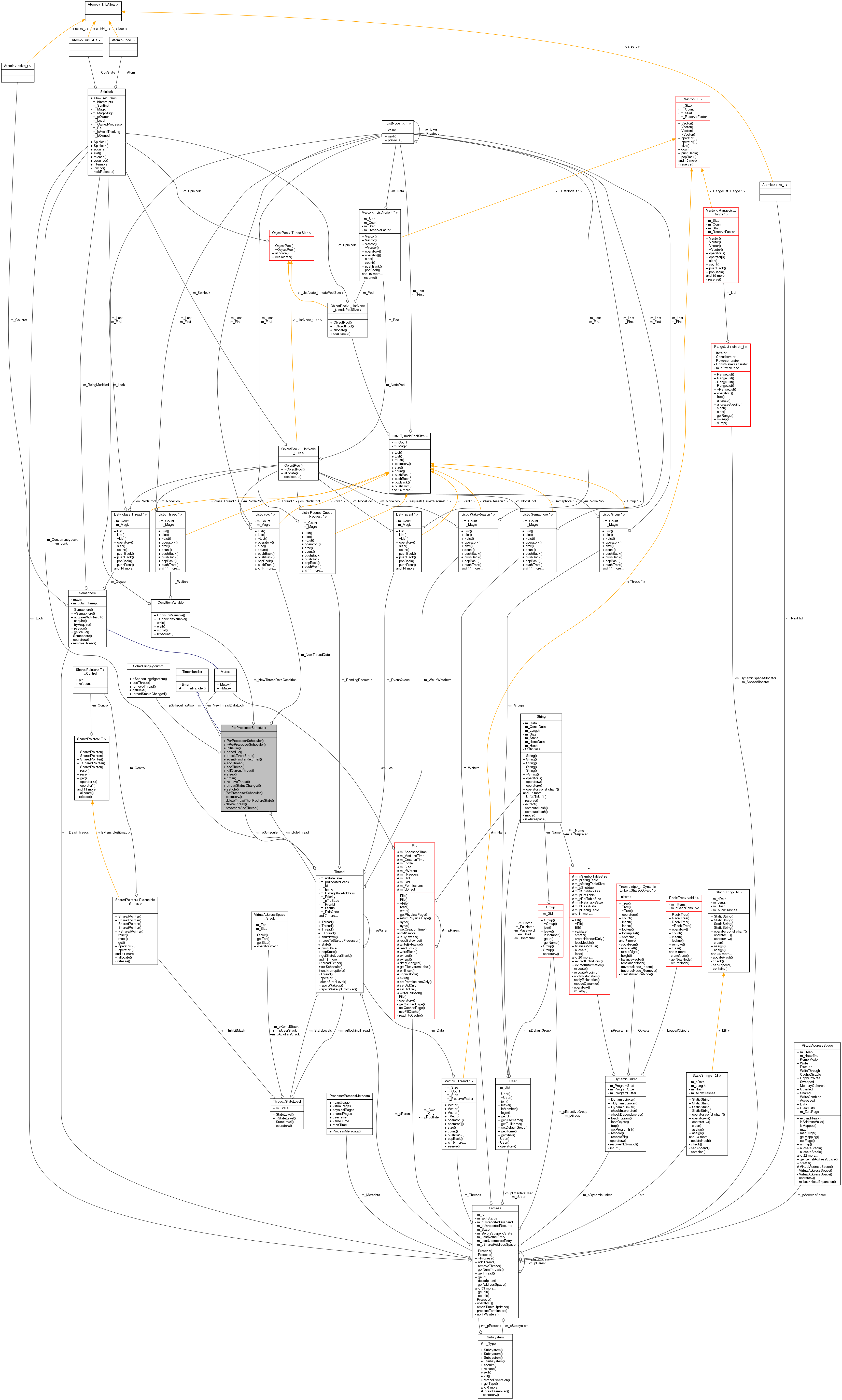 Inheritance diagram for PerProcessorScheduler:
Inheritance diagram for PerProcessorScheduler: Collaboration diagram for PerProcessorScheduler:
Collaboration diagram for PerProcessorScheduler:Public Member Functions | |
| PerProcessorScheduler () | |
| void | initialise (Thread *pThread) |
| void | schedule (Thread::Status nextStatus=Thread::Ready, Thread *pNewThread=0, Spinlock *pLock=0) |
| void | checkEventState (uintptr_t userStack) |
| void | eventHandlerReturned () NORETURN |
| void | addThread (Thread *pThread, Thread::ThreadStartFunc pStartFunction, void *pParam, bool bUsermode, void *pStack) |
| void | addThread (Thread *pThread, SyscallState &state) |
| void | killCurrentThread (Spinlock *pLock=0) NORETURN |
| void | sleep (Spinlock *pLock=0) |
| void | timer (uint64_t delta, InterruptState &state) |
| void | removeThread (Thread *pThread) |
| void | threadStatusChanged (Thread *pThread) |
| void | setIdle (Thread *pThread) |
Private Member Functions | |
| PerProcessorScheduler (const PerProcessorScheduler &) | |
| PerProcessorScheduler & | operator= (const PerProcessorScheduler &) |
Static Private Member Functions | |
| static void | deleteThreadThenRestoreState (Thread *pThread, SchedulerState &newState, volatile uintptr_t *pLock=0) NORETURN |
| static void | deleteThread (Thread *pThread) |
| static int | processorAddThread (void *instance) NORETURN |
Private Attributes | |
| SchedulingAlgorithm * | m_pSchedulingAlgorithm |
| Mutex | m_NewThreadDataLock |
| ConditionVariable | m_NewThreadDataCondition |
| List< void * > | m_NewThreadData |
| Thread * | m_pIdleThread |
Detailed Description
Definition at line 37 of file PerProcessorScheduler.h.
Constructor & Destructor Documentation
| PerProcessorScheduler::PerProcessorScheduler | ( | ) |
Default constructor - Creates an empty scheduler with a new idle thread.
Definition at line 46 of file PerProcessorScheduler.cc.
|
private |
Copy-constructor
- Note
- Not implemented - singleton class.
Member Function Documentation
| void PerProcessorScheduler::addThread | ( | Thread * | pThread, |
| Thread::ThreadStartFunc | pStartFunction, | ||
| void * | pParam, | ||
| bool | bUsermode, | ||
| void * | pStack | ||
| ) |
Adds a new thread.
- Parameters
-
pThread The thread to add. pStartFunction The function to start the thread with. pParam void* parameter to give to the function. bUsermode Start the thread in User Mode? pStack Stack to start the thread with.
Definition at line 479 of file PerProcessorScheduler.cc.
References Spinlock::acquire(), SchedulingAlgorithm::addThread(), LocksCommand::checkSchedule(), FATAL, Process::getAddressSpace(), Processor::getInterrupts(), Thread::getKernelStack(), Thread::getLock(), Thread::getParent(), Thread::getStatus(), Thread::getTlsBase(), Processor::id(), Processor::information(), Processor::jumpKernel(), Processor::jumpUser(), LocksCommand::lockReleased(), Thread::m_Lock, m_pSchedulingAlgorithm, Process::recordTime(), Spinlock::release(), Processor::saveState(), Thread::setCpuId(), Processor::setInterrupts(), Thread::setScheduler(), Thread::setStatus(), Processor::setTlsBase(), Thread::state(), Processor::switchAddressSpace(), and Spinlock::unwind().
Referenced by ProcessorThreadAllocator::addThread(), and processorAddThread().
 Here is the caller graph for this function:
Here is the caller graph for this function:| void PerProcessorScheduler::addThread | ( | Thread * | pThread, |
| SyscallState & | state | ||
| ) |
Adds a new thread.
- Parameters
-
pThread The thread to add. state The syscall state to jump to.
Definition at line 607 of file PerProcessorScheduler.cc.
References Spinlock::acquire(), SchedulingAlgorithm::addThread(), LocksCommand::checkSchedule(), FATAL, Process::getAddressSpace(), Processor::getInterrupts(), Thread::getKernelStack(), Thread::getLock(), Thread::getParent(), Thread::getStatus(), Thread::getTlsBase(), Processor::id(), Processor::information(), LocksCommand::lockReleased(), Thread::m_Lock, m_pSchedulingAlgorithm, NOTICE, Process::recordTime(), Spinlock::release(), Processor::restoreState(), Processor::saveState(), Thread::setCpuId(), Processor::setInterrupts(), Thread::setScheduler(), Thread::setStatus(), Processor::setTlsBase(), Thread::state(), Processor::switchAddressSpace(), Process::trackTime(), and Spinlock::unwind().
| void PerProcessorScheduler::checkEventState | ( | uintptr_t | userStack | ) |
Looks for event handlers to run, and if found, dispatches one.
- Parameters
-
userStack The stack to use if the event has a user-mode handler. Usually obtained from an interruptState or syscallState.
- Todo:
- This is a quickfix for a bigger problem. I imagine it has something to do with calling execve directly without fork, meaning the memory is cleaned up but the state level stack information is not.
Definition at line 310 of file PerProcessorScheduler.cc.
References PhysicalMemoryManager::allocatePage(), VirtualAddressSpace::allocateStack(), Event::getHandlerAddress(), Event::getHandlerBuffer(), Thread::getId(), Processor::getInterrupts(), VirtualAddressSpace::getMapping(), Thread::getNextEvent(), PhysicalMemoryManager::getPageSize(), Thread::getParent(), Thread::getScheduler(), Thread::getStateLevel(), Event::getTrampoline(), Processor::information(), PhysicalMemoryManager::instance(), Event::isDeletable(), Thread::isInterruptible(), VirtualAddressSpace::isMapped(), Processor::jumpUser(), VirtualAddressSpace::KernelMode, VirtualAddressSpace::map(), panic(), Thread::popState(), Thread::pushState(), Process::recordTime(), Processor::saveState(), Thread::sendEvent(), Event::serialize(), Processor::setInterrupts(), Process::trackTime(), and VirtualAddressSpace::Write.
Referenced by schedule(), and sleep().
 Here is the caller graph for this function:
Here is the caller graph for this function:
|
staticprivate |
Switches stacks, calls PerProcessorScheduler::deleteThread, then context switches.
- Note
- Implemented in core/processor/ARCH/asm
Referenced by killCurrentThread().
 Here is the caller graph for this function:
Here is the caller graph for this function:| void PerProcessorScheduler::eventHandlerReturned | ( | ) |
Assumes this thread has just returned from executing a event handler, and lets it resume normal execution.
Definition at line 468 of file PerProcessorScheduler.cc.
References Processor::information(), Thread::popState(), Processor::restoreState(), Processor::setInterrupts(), and Thread::state().
| void PerProcessorScheduler::initialise | ( | Thread * | pThread | ) |
Initialises the scheduler with the given thread.
Definition at line 126 of file PerProcessorScheduler.cc.
References SchedulingAlgorithm::addThread(), Thread::detach(), Thread::getKernelStack(), Thread::getParent(), Machine::getSchedulerTimer(), Thread::getTlsBase(), Processor::id(), Processor::information(), m_pSchedulingAlgorithm, panic(), processorAddThread(), Thread::setCpuId(), Thread::setStatus(), and Processor::setTlsBase().
| void PerProcessorScheduler::killCurrentThread | ( | Spinlock * | pLock = 0 | ) |
Destroys the currently running thread.
- Note
- This calls Thread::~Thread itself!
Definition at line 711 of file PerProcessorScheduler.cc.
References Spinlock::acquire(), LocksCommand::checkSchedule(), deleteThreadThenRestoreState(), Thread::detached(), Spinlock::exit(), FATAL, Process::getAddressSpace(), Thread::getKernelStack(), Thread::getLock(), SchedulingAlgorithm::getNext(), Thread::getParent(), Thread::getTlsBase(), Processor::information(), LocksCommand::lockReleased(), m_pSchedulingAlgorithm, panic(), SchedulingAlgorithm::removeThread(), Processor::setInterrupts(), Thread::setStatus(), Processor::setTlsBase(), Thread::shutdown(), Thread::state(), and Processor::switchAddressSpace().
|
private |
Assignment operator
- Note
- Not implemented - singleton class
Referenced by Thread::detached().
 Here is the caller graph for this function:
Here is the caller graph for this function:
|
staticprivate |
- Todo:
- handle result
Definition at line 71 of file PerProcessorScheduler.cc.
References Spinlock::acquire(), Semaphore::acquire(), addThread(), List< T, nodePoolSize >::count(), FATAL, Thread::getStatus(), Processor::id(), Processor::information(), Thread::m_Lock, List< T, nodePoolSize >::popFront(), List< T, nodePoolSize >::pushBack(), schedule(), Thread::setCpuId(), and ConditionVariable::wait().
Referenced by initialise().
 Here is the caller graph for this function:
Here is the caller graph for this function:| void PerProcessorScheduler::schedule | ( | Thread::Status | nextStatus = Thread::Ready, |
| Thread * | pNewThread = 0, |
||
| Spinlock * | pLock = 0 |
||
| ) |
Picks another thread to run, if there is one, and switches to it.
- Parameters
-
nextStatus The thread status to assign the current thread when it is swapped. pNewThread Overrides the next thread to switch to. pLock Optional lock to release when the thread is safely locked.
Definition at line 152 of file PerProcessorScheduler.cc.
References Spinlock::acquire(), checkEventState(), LocksCommand::checkSchedule(), Spinlock::exit(), FATAL, Process::getAddressSpace(), Processor::getInterrupts(), Thread::getKernelStack(), Thread::getLock(), SchedulingAlgorithm::getNext(), Thread::getParent(), Thread::getScheduler(), Thread::getStateLevel(), Thread::getTlsBase(), Processor::information(), LocksCommand::lockReleased(), m_pSchedulingAlgorithm, Process::recordTime(), Spinlock::release(), Processor::restoreState(), Processor::saveState(), Processor::setInterrupts(), Thread::setStatus(), Processor::setTlsBase(), Thread::state(), Processor::switchAddressSpace(), Process::trackTime(), Spinlock::unwind(), and WARNING.
Referenced by processorAddThread(), sleep(), and timer().
 Here is the caller graph for this function:
Here is the caller graph for this function:| void PerProcessorScheduler::sleep | ( | Spinlock * | pLock = 0 | ) |
Puts a thread to sleep.
- Parameters
-
pLock Optional, will release this lock when the thread is successfully in the sleep state.
- Note
- This function is here because it acts on the current thread. Its counterpart, wake(), is in Scheduler as it could be called from any thread.
Definition at line 787 of file PerProcessorScheduler.cc.
References checkEventState(), Processor::information(), Spinlock::release(), and schedule().
|
virtual |
TimerHandler callback.
Implements TimerHandler.
Definition at line 812 of file PerProcessorScheduler.cc.
References Subsystem::exit(), Thread::Exit, Thread::getParent(), Thread::getUnwindState(), Processor::information(), m_pSchedulingAlgorithm, schedule(), and SchedulingAlgorithm::threadStatusChanged().
Member Data Documentation
|
private |
The current SchedulingAlgorithm
Definition at line 122 of file PerProcessorScheduler.h.
Referenced by addThread(), initialise(), killCurrentThread(), schedule(), and timer().
The documentation for this class was generated from the following files:








 1.8.11
1.8.11